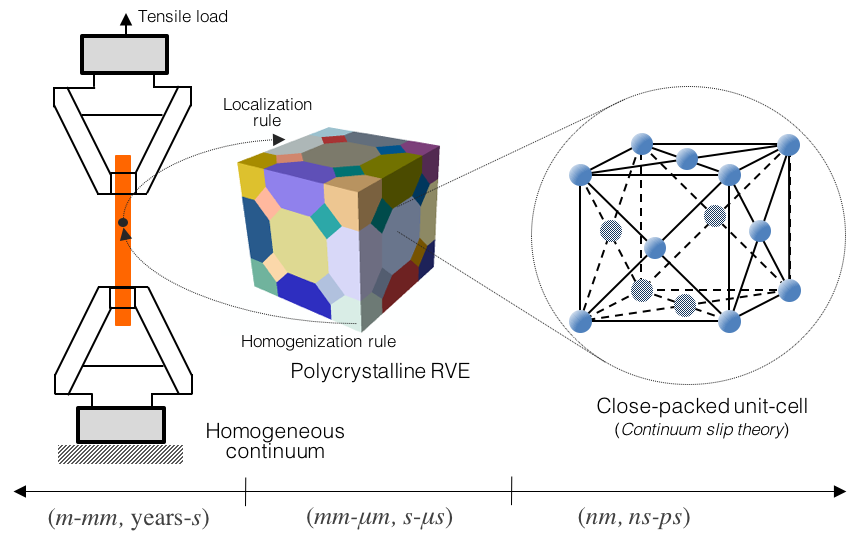Materials are inherently multiscale in nature, with the lower-scale properties contributing significantly to the bulk mechanical response. While significant advances have been made in understanding the phenomena at lower scale, modeling of mechanics of such processes has been thwarted by a lack of appropriate computational tools which link disparate length and time scales from the lower level to the system level. Our objective is to adopt a multiscale viewpoint and seek explanations of phenomena observed at the upper-scale based on lower-scale physics and computations. However, this is extremely challenging to model as complex lower-scale processes have nonlinear effects, which propagate through the scales. We have developed a class of multiscale methods known as global-local or computational homogenization techniques with application to various areas including computational mechanics of molecular crystals, computational radiation material science, and multiscale modeling of composites.
Jacobian-free Multiscale Method
The Jacobian-free Multiscale Method (JFMM) is a novel modeling paradigm that ensures self-consistency of the macro- and micro-scale coupling within the framework of hierarchical multiscale model (Figure 1). This approach uses self-consistent Newton-Krylov iterations to couple scales. A major criticism of most multiscale approaches is that they are computationally intensive, requiring heavy computational resources and limiting application to simplistic problem geometries. Iterative algorithms employed by Newton-Krylov processes could certainly benefit from preconditioning. However, the development of effective preconditioniers has been challenging without adequate knowledge of the underlying Jacobian matrices, which are not explicitly computed in these techniques. We have developed a novel block preconditioner that circumvents this issue by effectively clustering eigenvalues of the tangent matrix, without actually computing them. We have not only demonstrated the effectiveness of this approach (Figure 2), but also performed in-depth error analysis of this technique which establishes it as a robust practical computational tool for engineering problems with large degrees of freedom. This information-passing multiscale modeling approach is general and it can be extended to link physics at disparate length and time scales.
Figure 1. Jacobian-free Multiscale Modeling paradigm.
Figure 2. Left panel compares the computational time (sec) for the JFMM and FE2 method. Convergence of the preconditioned and non-preconditioned GMRES iterations at the macroscale in the L2 norm of the residual is shown in the middle panel, whereas, number of GMRES iterations within each Newton iteration is shown in right panel.
Explicit Global-local Multiscale Method
The explicit global-local multiscale model usages the global-local approach at the spatial scale while taking advantage of the explicit computation at the temporal scale. The explicit time integration algorithms lend themselves to efficient parallelization resulting an efficient computation of very large and highly nonlinear problems. Hence, instead of perceiving multiscale modeling and parallelization as two separate processes, we are interested in developing an integrated parallel multiscale method that is designed to take advantage of the specific architecture of these explicit time integration algorithms on massively parallel machines.
Relevant Publications
- Rahul, and De, S. (2015). Multiscale modeling of polycrystalline materials with Jacobian-free multiscale method (JFMM). Computational Mechanics, 55(4), 643-657.
- Rahul, and De, S. (2015). Analysis of the Jacobian-free multiscale method (JFMM). Computational Mechanics, 56(5), 769-783.
- Rahul, and De, S. (2011). An efficient block preconditioner for Jacobian-free global-local multiscale methods. International Journal for Numerical Methods in Engineering, 87(7), 639-663.
- Rahul, and De, S. (2010). An efficient coarse-grained parallel algorithm for matrix-free global-local multiscale computations on massively parallel systems. International Journal for Numerical Methods in Engineering, 82(3), 379-402.



